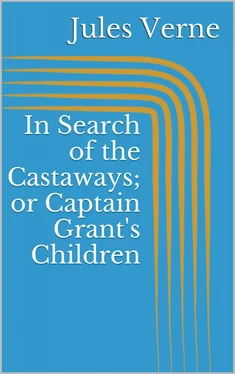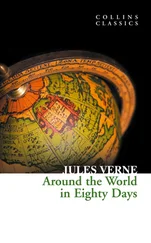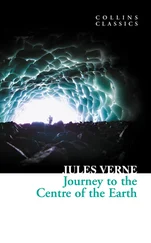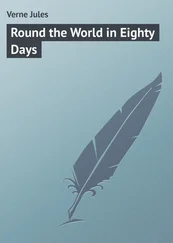1 ...7 8 9 11 12 13 ...25 But in spite of this melancholy reflection, the Frenchman submitted gracefully to the compulsory delay. He made himself amiable and merry, and even diverting, and enchanted the ladies with his good humor. Before the end of the day he was friends with everybody. At his request, the famous document was brought out. He studied it carefully and minutely for a long time, and finally declared his opinion that no other interpretation of it was possible. Mary Grant and her brother inspired him with the most lively interest. He gave them great hope; indeed, the young girl could not help smiling at his sanguine prediction of success, and this odd way of foreseeing future events. But for his mission he would have made one of the search party for Captain Grant, undoubtedly.
As for Lady Helena, when he heard that she was a daughter of William Tuffnell, there was a perfect explosion of admiring epithets. He had known her father, and what letters had passed between them when William Tuffnell was a corresponding member of the Society! It was he himself that had introduced him and M. Malte Brun. What a rencontre this was, and what a pleasure to travel with the daughter of Tuffnell.
He wound up by asking permission to kiss her, which Lady Helena granted, though it was, perhaps, a little improper.
Chapter VIII.
The Geographer's Resolution
MEANTIME the yacht, favored by the currents from the north of Africa, was making rapid progress toward the equator. On the 30th of August they sighted the Madeira group of islands, and Glenarvan, true to his promise, offered to put in there, and land his new guest.
But Paganel said:
"My dear Lord, I won't stand on ceremony with you. Tell me, did you intend to stop at Madeira before I came on board?"
"No," replied Glenarvan.
"Well, then, allow me to profit by my unlucky mistake. Madeira is an island too well known to be of much interest now to a geographer. Every thing about this group has been said and written already. Besides, it is completely going down as far as wine growing is concerned. Just imagine no vines to speak of being in Madeira! In 1813, 22,000 pipes of wine were made there, and in 1845 the number fell to 2,669. It is a grievous spectacle! If it is all the same to you, we might go on to the Canary Isles instead."
"Certainly. It will not the least interfere with our route."
"I know it will not, my dear Lord. In the Canary Islands, you see, there are three groups to study, besides the Peak of Teneriffe, which I always wished to visit. This is an opportunity, and I should like to avail myself of it, and make the ascent of the famous mountain while I am waiting for a ship to take me back to Europe."
"As you please, my dear Paganel," said Lord Glenarvan, though he could not help smiling; and no wonder, for these islands are scarcely 250 miles from Madeira, a trifling distance for such a quick sailer as the DUNCAN.
Next day, about 2 P. M., John Mangles and Paganel were walking on the poop. The Frenchman was assailing his companion with all sorts of questions about Chili, when all at once the captain interrupted him, and pointing toward the southern horizon, said:
"Monsieur Paganel?"
"Yes, my dear Captain."
"Be so good as to look in this direction. Don't you see anything?"
"Nothing."
"You're not looking in the right place. It is not on the horizon, but above it in the clouds."
"In the clouds? I might well not see."
"There, there, by the upper end of the bowsprit."
"I see nothing."
"Then you don't want to see. Anyway, though we are forty miles off, yet I tell you the Peak of Teneriffe is quite visible yonder above the horizon."
But whether Paganel could not or would not see it then, two hours later he was forced to yield to ocular evidence or own himself blind.
"You do see it at last, then," said John Mangles.
"Yes, yes, distinctly," replied Paganel, adding in a disdainful tone, "and that's what they call the Peak of Teneriffe!"
"That's the Peak."
"It doesn't look much of a height."
"It is 11,000 feet, though, above the level of the sea."
"That is not equal to Mont Blanc."
"Likely enough, but when you come to ascend it, probably you'll think it high enough."
"Oh, ascend it! ascend it, my dear captain! What would be the good after Humboldt and Bonplan? That Humboldt was a great genius. He made the ascent of this mountain, and has given a description of it which leaves nothing unsaid. He tells us that it comprises five different zones—the zone of the vines, the zone of the laurels, the zone of the pines, the zone of the Alpine heaths, and, lastly, the zone of sterility. He set his foot on the very summit, and found that there was not even room enough to sit down. The view from the summit was very extensive, stretching over an area equal to Spain. Then he went right down into the volcano, and examined the extinct crater. What could I do, I should like you to tell me, after that great man?"
"Well, certainly, there isn't much left to glean. That is vexing, too, for you would find it dull work waiting for a vessel in the Peak of Teneriffe."
"But, I say, Mangles, my dear fellow, are there no ports in the Cape Verde Islands that we might touch at?"
"Oh, yes, nothing would be easier than putting you off at Villa Praya."
"And then I should have one advantage, which is by no means inconsiderable—I should find fellow-countrymen at Senegal, and that is not far away from those islands. I am quite aware that the group is said to be devoid of much interest, and wild, and unhealthy; but everything is curious in the eyes of a geographer. Seeing is a science. There are people who do not know how to use their eyes, and who travel about with as much intelligence as a shell-fish. But that's not in my line, I assure you."
"Please yourself, Monsieur Paganel. I have no doubt geographical science will be a gainer by your sojourn in the Cape Verde Islands. We must go in there anyhow for coal, so your disembarkation will not occasion the least delay."
The captain gave immediate orders for the yacht to continue her route, steering to the west of the Canary group, and leaving Teneriffe on her larboard. She made rapid progress, and passed the Tropic of Cancer on the second of September at 5 A. M.
The weather now began to change, and the atmosphere became damp and heavy. It was the rainy season, " le tempo das aguas ," as the Spanish call it, a trying season to travelers, but useful to the inhabitants of the African Islands, who lack trees and consequently water. The rough weather prevented the passengers from going on deck, but did not make the conversation any less animated in the saloon.
On the 3d of September Paganel began to collect his luggage to go on shore. The DUNCAN was already steaming among the Islands. She passed Sal, a complete tomb of sand lying barren and desolate, and went on among the vast coral reefs and athwart the Isle of St. Jacques, with its long chain of basaltic mountains, till she entered the port of Villa Praya and anchored in eight fathoms of water before the town. The weather was frightful, and the surf excessively violent, though the bay was sheltered from the sea winds. The rain fell in such torrents that the town was scarcely visible through it. It rose on a plain in the form of a terrace, buttressed on volcanic rocks three hundred feet high. The appearance of the island through the thick veil of rain was mournful in the extreme.
Lady Helena could not go on shore as she had purposed; indeed, even coaling was a difficult business, and the passengers had to content themselves below the poop as best they might. Naturally enough, the main topic of conversation was the weather. Everybody had something to say about it except the Major, who surveyed the universal deluge with the utmost indifference. Paganel walked up and down shaking his head.
Читать дальше












